9 Best Long-Range Rifle Scopes in 2025 – Reviews & Top Picks
Last Updated on
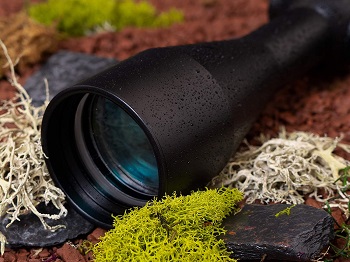
Join us while we look at the best long-range rifle scopes to help you make an informed decision.

A Quick Comparison of Our Favorites (Updated in 2025)
| Image | Product | Details | ||
|---|---|---|---|---|
| Best Overall |
 |
Vortex Optics Strike Riflescope |
|
CHECK PRICE |
| Best Value |
 |
CVLIFE 4-16×44 Tactical Rifle Scope |
|
CHECK PRICE |
| Best Precision Rifle Scope |
 |
Burris Xtreme XTR II Precision Rifle Scope |
|
CHECK PRICE |
 |
Vortex Optics Diamondback Tactical Rifle Scope |
|
CHECK PRICE | |
 |
Monstrum G2 FFP Rifle Scope |
|
CHECK PRICE |
The 9 Best Long-Range Rifle Scopes
1. Vortex Optics Strike Riflescope – Best Overall
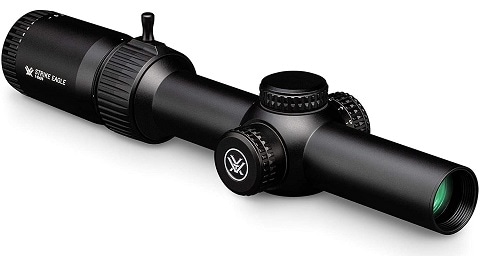
The Vortex Optics Strike Riflescope is our pick for the best overall long-range rifle scope. It’s lightweight at only 8 ounces yet is extremely durable and well built. It’s waterproof, fog-proof, and shockproof to allow you to use it in all weather conditions. It allows you to adjust for wind and elevation, and you can also adjust the magnification to the power of 6 for seeing more distant objects. The fast focus dial helps you quickly make adjustments, and the battery-powered scope provides you with illumination so you can better see the reticule.
The only downside we experienced while using this scope is that the mount didn’t come with it, so you will need to purchase it separately. Some people prefer the single dot to the crosshair of this model, and there isn’t as much magnification as many other models, but it’s more than enough for many situations.
- 8 ounces
- 1-6 x 24 magnification
- 11 illumination settings
- Fast focus dial
- Waterproof
- Durable
- Mount is separate
- Not as much magnification
2. CVLIFE 4-16×44 Tactical Rifle Scope – Best Value
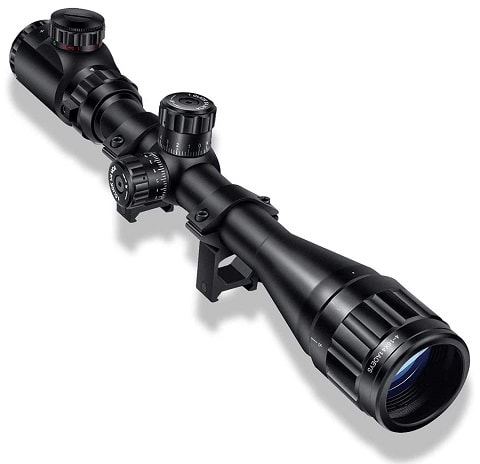
The CVLIFE 4-16×44 Tactical Rifle Scope is our pick as the best long-range rifle scope for the money. It has a locking turret that allows you to zero it in and lock it in place, so the adjustments don’t move while you are working. Coated optical glass helps you see your image more clearly, and the high strength aluminum body is durable and handles shock from gunfire well. A sunshade prevents whiteout and glare from objective lens while you are using it. It has very high magnification and allows you to adjust up to the power of 16 for distant objects, and it includes the rail mounts needed to attach it to the gun.
The biggest problem we had while using the CVLIFE 4-16×44 was that the controls could be a little hard to turn. Otherwise, it was very easy to set up on our rifle.
- Locking turret
- Coated optical glass
- High strength aluminum alloy
- Sunshade
- Includes rail mounts
- 4-16 X 44 magnification
- Easy to set up
- Some controls are hard to turn
3. Burris Xtreme XTR II Precision Rifle Scope – Best Precision Rifle Scope

The Burris Xtreme XTR II Precision Rifle Scope is our pick for the best precision rifle scope. It has a large 50mm objective lens with 8–40 magnification for focusing on distant objects. The 5x zoom helps you lock to your target quickly, and you can make the adjustments easily while you are using the scope. The zero-click stop adjustment lets you return to previous settings without counting clicks. Eleven brightness settings help you see the reticule in any light condition, and the high-grade optical glass and nitrogen filled tube prevent fogging.
The only thing we didn’t like about the Burris Xtreme XTR II was that it’s quite heavy compared to many other models and it can weigh down the gun on long hunts.
- 8-40 x 50 magnification
- Zero click stop adjustment
- 5x zoom
- Ergonomic side focus
- High-grade optical glass
- Waterproof
- Nitrogen filled
- 11 brightness settings
- 2 pounds
4. Vortex Optics Diamondback Tactical Rifle Scope
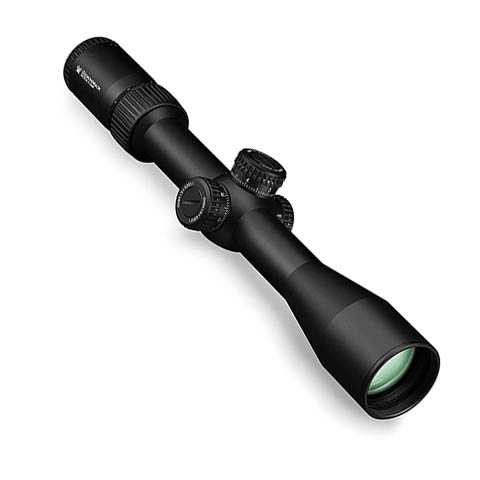
The Vortex Optics Diamondback Tactical Rifle Scope is not too heavy at 1.4 pounds, and it has extreme magnification, which you can set between 6-24 x 50mm. Extra low dispersion glass prevents glare, and the reticule is easy to see, even at extreme magnification. The 4x zoom makes it quick and easy to focus on distant targets, and it has a durable aluminum build that won’t lose focus between shots.
The only problem we had when we were using the Vortex Optics Diamondback was that the glass isn’t quite as clear as many other models we reviewed. Other reviews might have rated this scope higher, but we think it’s slightly overpriced for performance, and the Vortex Strike provides better value. Nevertheless, it’s a top-tier scope and worth consideration.
- 4 pounds
- Extra-low dispersion glass
- 4x zoom
- Sturdy build
- 6–24 X 50 magnification
- Easy to see the reticule
- Glass isn’t as clear as other models
5. Monstrum G2 FFP Rifle Scope
The Monstrum G2 FFP Rifle Scope features a large magnification of 6-24 x 50 magnification and plenty of eye relief, which is an essential quality for those of us who wear glasses. You can also adjust the objective lens for a sharper focus, and there is a touch button to illuminate the reticule with either green or red. It also comes with a sunshade to prevent glare and spring-loaded flip-up lens covers that protect the scope while you are traveling.
The downside to the Monstrum G2 FFP Rifle Scope is that we had a hard time getting it zeroed in and took more effort than many other models to use for the first time. We also had a problem with the reticule flickering on and off while we were using it.
- 6-24 X 50 magnification
- Good eye relief
- Adjustable objective lens
- Touch button reticule illumination
- Includes sunshade
- Flip-up lens covers
- Hard to get zeroed in
- Sometimes the reticule flickers
6. BARSKA Varmint Mil-Dot Riflescope
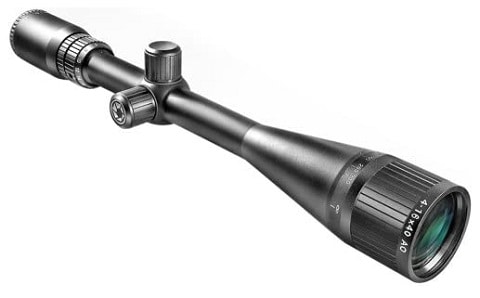
The BARSKA Varmint Mil-Dot Riflescope is lightweight at 1.2 pounds, and it features a 4–16 x magnification. The lenses have a special coating so they will not fog up in humid weather, and it also features wind and elevation adjustments to get better accuracy during your hunts. It also comes with a cleaning cloth to keep the lenses clean and removable lens caps to protect the scope while you are traveling.
The problem we had while we were using the BARSKA Varmint was the wind adjustment dial is not durable, and ours broke after a few weeks of use. The image also becomes cloudy when using the scope at the extreme range.
- 4 -16x magnification
- Coated lenses
- 2 pounds
- Includes lens caps and cleaning cloth
- Wind and elevation adjustments
- Wind adjustment not durable
- It gets foggy at extreme zoom
7. Athlon Optics Argos BTR Riflescope
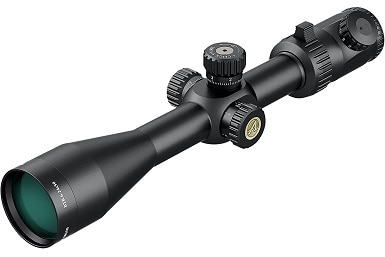
The Athlon Optics Argos BTR Riflescope is a high magnification scope with settings between 8–34 x 56. It has clear multicoated lenses that help reduce glare and produce a sharper image. They etched the reticule into the glass, so it’s always easy to see, and you can also illuminate it in lo light conditions to track your target better. The tube is argon filled and waterproof to prevent fogging.
The problem we experienced while using the Athlon Optics Argos is that there is not much eye relief, and it takes a bit of practice to get used to looking through the scope. We also noticed that the image would blur at extreme magnifications, so we could not use the full range of the scope.
- 8 – 34 x 56 magnification
- Multicoated lenses
- High-grade argon-filled aluminum tube
- Illuminated and etched reticule
- It gets blurry at higher magnifications
- Not much eye relief
8. Ade Advanced Optics Long Range Rifle Scope
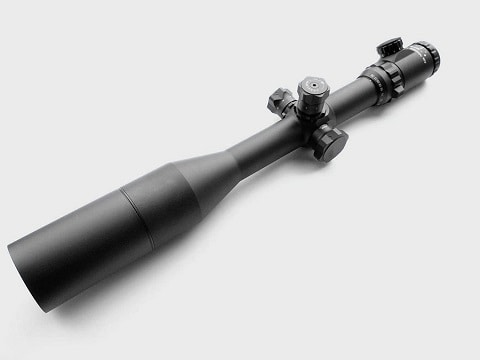
The Ade Advanced Optics Long Range Rifle Scope is an inexpensive scope that delivers a magnification of 6-25 x 56. The illuminated reticule helps you see the crosshair in low light conditions, and the tube is nitrogen-filled to prevent fog on the inside of the lens. It also includes a sunshade to reduce glare and all mounts to attach it to the gun.
While we were using the Ade Advanced, we found it hard to see the reticule. The hardware was flimsy, and it was hard to zero the turrets to get it ready to use. One other problem we had was that the image became blurry and unusable after about 100 yards.
- 6-25 x 56 magnification
- Illuminated reticule
- Nitrogen filled
- Include sunshade and mounts
- Hard to see the reticule
- Hard to zero the turrets
- Too blurry after 100 yards
9. Sniper KT 12-60X60 SAL Long Range Rifle Scope
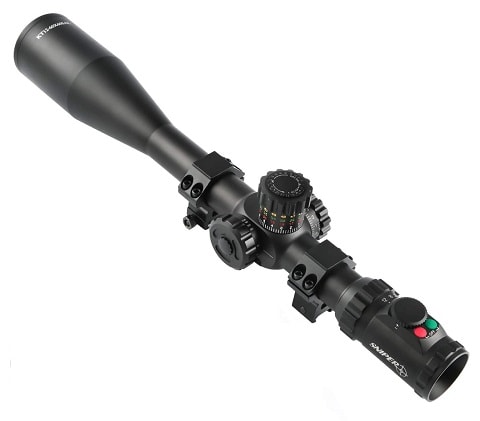
The Sniper KT 12-60X60 SAL Long Range Rifle Scope is the last model on our list to review, but it still has plenty of great features. It has plenty of magnification and has a rating of 12-60 x 60. The illuminated reticle helps you get more accurate shots in low light conditions. The nitrogen-filled body prevents the inside of the lens from becoming foggy and helps produce a clearer image.
The Sniper KT 12-60X60 SAL downside is that it’s extremely heavy at about 2.5 pounds and weighs down the gun, especially if you need to carry it long distances. Its stiff controls make it hard to switch magnifications, and it took us a long time to get it zeroed-in correctly. We also felt the image was dim, especially when using it on higher magnifications.
- Illuminated reticule
- Nitrogen-filled body
- 12-60 x 60 magnification
- 5 pounds
- Stiff to switch magnifications
- Hard to zero in
- Dim image

Buyer’s Guide – Choosing the Best Long-Range Rifle Scope
In this section, we’ll look at some of the important things to look for while you are shopping for your next long-range rifle scope.
Magnification
You will notice that most scopes have a magnification listed as something like 12-60 x 60. This measurement tells you that the scope is capable of magnification between 12 and 60. Usually, the scope will have a rotary dial that will allow you to select between 12, 24-, 36-, 48-, and 60-times magnification. The second 60 in the measurement refers to the objective lens’s size, and we’ll talk about that next. More magnification allows you to target objects that are further away, but it can also be difficult to see the higher magnifications because the image gets smaller at these settings.
We recommend considering the average distance of your target and purchase accordingly. There is little need to get a scope with more magnification than you need and will usually result in a poorer image at the range you need.
Objective Lens
You can usually find the size of the objective lens by looking at the magnification rating. If you see a scope with an 8-34 x 56 rating, it tells you that the objective lens is 56 millimeters (mm) wide. Larger objective lenses allow lighter to enter the scop, which will provide the user with a brighter image. We recommend choosing the largest size possible, especially if you will be using it in low light conditions or with extreme magnification. The more magnification you use, the lighter you will need to create a usable image.
Adjustable Objective Lens
Some of the models on our list have an adjustable objective lens. This feature allows you to get a better focus and adjust the reticule for the target. This option is often seen on long-range scopes like these because it allows for more accuracy.
Eye Relief
Eye relief refers to how close your eye needs to be to see the image. The less eye relief a scope has, the more difficult it is to use. Eye relief will always get worse when you increase the magnification, so you can expect there to be little eye relief with all of the long-range, high magnification scopes we have listed above. However, we tried to point out any scopes that feature better eye relief. On most scopes, a larger objective lens will result in better eye relief so you can place your eye further from the scope.
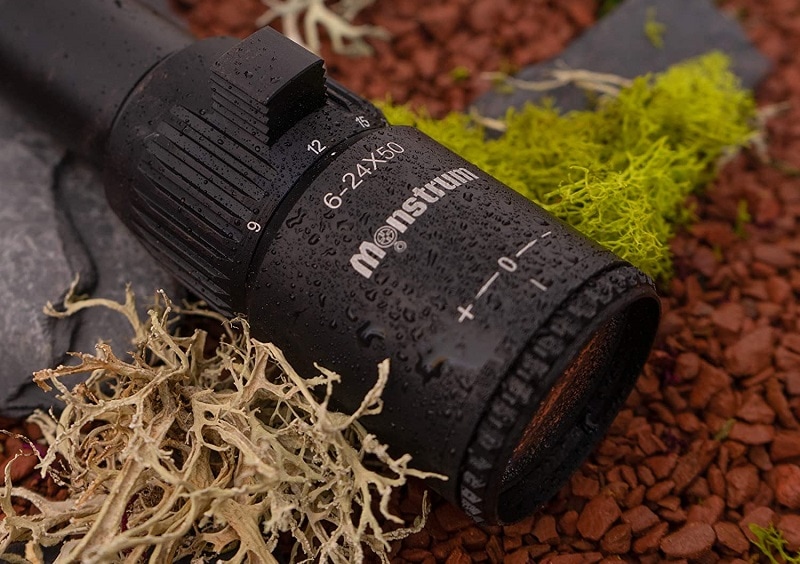
Coated Lenses
There are several coatings that manufacturers can apply to the lens. Some of the coatings will help reduce glare, while others make the glass easier to see through and more resistant to fogging. Lenses and their coatings are getting better every year as the technology improves and the cost comes down, but there are four terms you can look for on the packaging to tell you a little more about each model’s lens coating.
- Single coated: A least one lens has a single coating.
- Fully coated: All lenses have a single coating.
- Multicoated: At least one lens will have multiple coatings.
- Fully multicoated: All the lenses will be multicoated.
Reticle
The scope reticle is the dot or crosshairs that you will use to aim at your target. There is a wide range of different styles to better lock on your target, with popular names like the German reticle, firefly, and 4A. Some use battery power to illuminate the reticle, so you can see the center point even in low light. Many of the models on our list allow you to choose between red and green illumination.
Field of View
The scope’s field of view is a term that describes how wide the image is inside the scope and how much of the landscape you can see. The size objective lens is directly related to the field of view, with larger lenses providing you with a wider picture and a larger field of view. Images that are too small can make it difficult and time-consuming to find your target in the scope and can ruin your shot. The field of view always gets smaller with high magnification.
Minute of Angle
Minute of angle refers to how much the bullet changes course over distance and through the wind. Many of the gun scopes on our list have controls that allow you to compensate for MOA by supplying you with controls to adjust for altitude and wind. If there are no added dials to account for these factors, the scope uses a Mil-Dot Reticle that replaces the lines in a crosshair with small dots to help you adjust accordingly. Mil scopes are usually less costly than those that use the minute of angle adjustments, but the settings are more difficult to communicate to other users.
Turrets
Turrets are another essential part of the long-range rifle scope. You will urn the turrets to make adjustments, and some can be easy to turn while others are rough. We recommend looking for turrets that provide some resistance so you can get more accurate results but not something that’s hard to turn or feels rough as it travels.
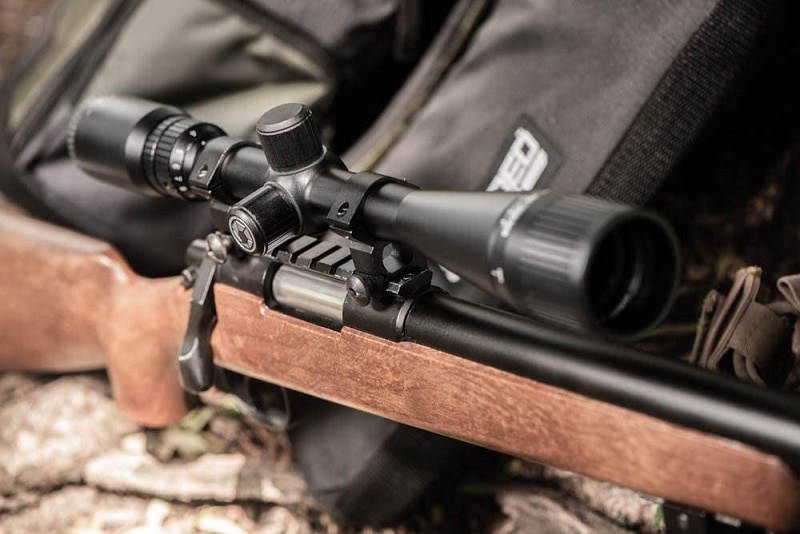
If your scope has multiple turrets, the top one will adjust the elevation and will help you compensate for minute of angle over long distances. The turret on the side will help you compensate for wind coming from the right or left. Some scopes will make an audible click as you turn them, while others won’t. We recommend the clicking type, especially for inexperienced rifle users, because it makes it easier to return to previous settings.
Zeroing Your Rifle
You zero your rifle depending on how far away you think your target will be. If you are shooting at targets 100 yards away, you zero it by making adjustments to your scope, so the reticule shows you where the bullet will hit at that distance. If you move the targets out to 200 yards, or the wind speed suddenly changes, you will need to re-zero the gun to stay on target. Some scopes use turrets to make these adjustments, while others will require a tool like a Hex wrench or a screwdriver.
Since we are looking for a long-range rifle scop that will need frequent adjustments, we recommend a scope with turrets to speed up the process of zeroing the rifle for different targets.

Conclusion
The scope you use for your long-range rifle will depend heavily on your experience level and preferences. However, choosing a scope like our pick for the best overall is a great starting point for any rifle. The Vortex Optics Strike Riflescope provides the user with a clear picture and turret to adjust for distance and wind speed. It’s lightweight and won’t add to the gun’s weight but is durable enough to survive a few drops. Another smart choice is the CVLIFE 4-16×44 Tactical Rifle Scope, our pick for the best value. This model has locking turrets, so they don’t get bumped after you set them, and it has plenty of magnification. It’s easy to set up and comes with everything you need to attach it to your rifle at a bidet price.
We hope you have enjoyed reading over this guide and found it helpful and informative. If you have found your next gun accessory on our list, please share these ten best long-range rifle scopes on Facebook and Twitter.
Related Reading:
- 6 Best Scopes for 6.5 Creedmoor — Reviews & Top Picks
- 5 Best .300 Blackout Scopes & Optics — Top Picks & Reviews
Table of Contents
- A Quick Comparison of Our Favorites (Updated in 2025)
- The 9 Best Long-Range Rifle Scopes
- 1. Vortex Optics Strike Riflescope – Best Overall
- 2. CVLIFE 4-16×44 Tactical Rifle Scope – Best Value
- 3. Burris Xtreme XTR II Precision Rifle Scope – Best Precision Rifle Scope
- 4. Vortex Optics Diamondback Tactical Rifle Scope
- 5. Monstrum G2 FFP Rifle Scope
- 6. BARSKA Varmint Mil-Dot Riflescope
- 7. Athlon Optics Argos BTR Riflescope
- 8. Ade Advanced Optics Long Range Rifle Scope
- 9. Sniper KT 12-60X60 SAL Long Range Rifle Scope
- Buyer’s Guide – Choosing the Best Long-Range Rifle Scope
- Conclusion
About the Author Robert Sparks
Robert’s obsession with all things optical started early in life, when his optician father would bring home prototypes for Robert to play with. Nowadays, Robert is dedicated to helping others find the right optics for their needs. His hobbies include astronomy, astrophysics, and model building. Originally from Newark, NJ, he resides in Santa Fe, New Mexico, where the nighttime skies are filled with glittering stars.
Related Articles:
How to Clean a Refractor Telescope: Step-by-Step Guide
How to Clean a Telescope Eyepiece: Step-by-Step Guide
How to Clean a Rifle Scope: 8 Expert Tips
Monocular vs Telescope: Differences Explained (With Pictures)
What Is a Monocular Used For? 8 Common Functions
How to Clean a Telescope Mirror: 8 Expert Tips
Brightfield vs Phase Contrast Microscopy: The Differences Explained
SkyCamHD Drone Review: Pros, Cons, FAQ, & Verdict




